
3247 Rush Mendon Road
HONEOYE FALLS, NY 14472
Mailing Address:
3247 Rush Mendon Road
HONEOYE FALLS, NY 14472
Phone: 585-624-7777
MAKE AN INQUIRY
View our WEBSITE
EIN: 33-1082985Founded: 2004
Profile Last Updated December 10, 2025
Public Charity
Click here to view listing(s) of the program horses we are seeking

The Guardian Seal of Transparency is awarded annually to recognize an organization's commitment to transparency and accountability by their willingness to make comprehensive data about their programs, horse care practices, and governance available for public scrutiny. The Guardian Seal of Transparency is NOT an endorsement.
Last Updated: February 13, 2026
Equicenter, Inc. has not attained the Guardian designation for 2026.
MISSION & PROGRAMS
Mission:EquiCenter fosters growth, wellness, and educational opportunities for people of all abilities through the power of horses, horticultural, and nature-based experiences.
Our organization conducts Equine Assisted Services in accordance with the EQUUS Foundation Guidelines on Qualifications of Organizations Conducting Equine Assisted Services (EAS).
Our organization provides outreach and/or public education programs involving horses.
Over 90% of our total programs and services are equine-related.
Our organization is directly responsible for the care and shelter of equines involved in our programs.
Our organization does not CURRENTLY use satellite, overflow, foster, and/or outreach facilities.
Please describe what steps your organization takes to ensure that:
1) all interactions between your equines and people are mutually beneficial and conducted in accordance with the Guidelines for Human-Equine Interactions stated below;
2) all equines in the care of our organization and/or equines that participate in the organization's program have access to clean drinking water at all times; nutritious food in sufficient quantity, including natural forage such as pasture grass and/or hay; appropriate veterinary, farrier, and dental care; shelter and protection from the weather; sufficient safe space to move around comfortably on a daily basis; and daily opportunity to freely interact and have contact with other equines:
Question #1:
(Guideline #1) EquiCenter prioritizes the comfort and dignity of their equines, ensuring mutually beneficial interactions through careful planning and individualized care. To achieve this, each horse's workload is managed with designated weekly lesson limits, including unmounted horsemanship, preventing overexertion. Furthermore, student-horse pairings are thoughtfully made based on equine personality, considering preferences for grooming, leading, and prop work, fostering positive interactions. For mounted lessons, rigorous weight limits are established, calculated as a percentage of the horse's body weight, adjusted for age, confirmation, and health conditions, with further reductions for saddle and pad weight, and rider balance. This ensures the horse's physical well-being and prevents strain. Lesson durations are kept within 30-45 minutes under saddle, and a holistic approach to equine health is maintained, incorporating professional saddle fitting, chiropractic, acupuncture, cold laser therapy, and massage. This comprehensive care demonstrates a commitment to the equines' physical and mental well-being, treating them as valued partners rather than mere tools.
(Guideline #2) All of our therapy horses are chosen based on their quiet, calm and friendly dispositions. IF we ever try a horse that we know will not be happy in a lesson program we do not accept them into our program. Should a horse demonstrate behaviors indicating it is no longer happy being a lesson horse it is retired, returned to its owner or transferred to another barn where it can enjoy a different job (after careful research and consideration).
(Guide #3) EquiCenter prioritizes the individual welfare of its equines by carefully tailoring programs and activities to each horse's temperament and needs. This is achieved through a multi-faceted approach. Firstly, instructors meticulously select horses for each student based on potential partnership, matching personalities and considering the horse's preferences and capabilities. This includes evaluating whether a horse enjoys working with props, its tolerance for trotting, and its aptitude for connection work, ensuring a comfortable and positive experience. Secondly, a pre-lesson evaluation is conducted by the instructor to assess the horse's current comfort level. Any signs of health or behavioral concerns result in the immediate removal of the horse from the lesson, and the Barn Manager or Senior Director of Operations is notified. This proactive monitoring ensures that each equine's individual welfare is respected and protected, and that their involvement in activities is appropriate to their temperament and well-being.
(Guideline #4) EquiCenter ensures programs and activities minimize impact on equines and their environment through rigorous staff training and comprehensive safety protocols. All instructors hold PATH (Professional Association of Therapeutic Horsemanship) certification, demonstrating adherence to established equine welfare guidelines. Prior to each lesson, instructors conduct thorough horse checks, immediately removing any equine exhibiting signs of stress, unsoundness, health, or behavioral concerns. The Barn Manager and Senior Director of Operations are promptly notified of such incidents. To safeguard both equine and human participants, lessons are immediately terminated if a student poses a safety risk, and the Senior Director of Programming is informed. All staff, volunteers, and participants are trained in emergency dismount procedures, and staff undergo extensive Emergency Action Plan training covering all facility-related scenarios. In preparation for unforeseen emergencies, first aid kits are strategically located throughout the facility, including the classroom, house, and South Barn, which also houses an AED and a dedicated equine first aid kit and supply room. All PATH instructors are First Aid/CPR certified, and the organization benefits from the expertise of a Licensed Veterinary Technician (Senior Director of Operations) and a Barn Manager with extensive animal health experience, ensuring prompt and appropriate responses to equine emergencies, with a veterinarian readily available when needed.
(Guideline #5) The “Horse Usage and Care” section of our CTRI handbook reads as follows:
“Our horses are the heart of our program, and as instructors, we are responsible for their health and well-being. Ensure that all equipment is properly fitted, horses are thoroughly groomed, and they are warmed up appropriately before lessons. The horse must be observed to be sound and calm prior to the start of their lesson by the instructor. It is also essential to monitor that riders are not negatively impacting the horses, paying close attention to their balance and form. For example, do not allow a student to bounce on the horse’s back if they are unable to maintain balance and remain centered. Our horses perform demanding work, so it is crucial to balance their workload, especially when it comes to trot work, to maximize their comfort and longevity. If you encounter any issues with a horse, please report them immediately to the Senior Director of Operations so a plan can be developed.”
In addition to written policy, all equine staff including instructors are trained in EquiCenter’s procedures for selecting, monitoring, and ensuring the well-being of equines in care. Before a horse is incorporated into active programming, it undergoes a trial period lasting two to eight weeks in which staff assess soundness, groundwork, and under-saddle behavior through mock lessons to determine whether the horse will be comfortable and well-suited as a lesson horse. Only after successfully passing this evaluation do horses begin a gradual integration into lessons under close monitoring to ensure their mental and physical well-being. At the start of each session and upon approval by the Senior Director of Operations and Senior Director of Programming, instructors carefully select horses for participants based on weight limits, workload, and personality compatibility.
EquiCenter has clear mechanisms to allow equines to “opt out” of program participation. If a horse exhibits any concerning behavior it is immediately removed from the lesson schedule and evaluated by staff, and a veterinarian if necessary, before returning to programming. All behavioral concerns are documented and tracked to identify potential causes. Additionally, instructors evaluate each horse at the start of every lesson, and remove them from lessons if further assessment is determined necessary. The Barn Manager conducts weekly evaluations to proactively address any changes in health, soundness, or behavior.
Safety is paramount at EquiCenter. As a PATH Intl. Premier Accredited Center, all equine programming adheres to the highest industry safety standards. In addition to PATH guidelines and standards of operations, EquiCenter follows internal safety protocols outlined in our instructor manual, volunteer handbook, participant handbook, employee handbook, and emergency action plan.
All programming aligns with EquiCenter’s mission to foster growth, wellness, and educational opportunities for people of all ages and abilities through the power of equestrian, horticultural, and outdoor experiences. This ensures that our equine-assisted services remain focused on providing meaningful, mission-driven experiences while prioritizing the well-being of both our participants and our horses.
Question #2:
EquiCenter provides comprehensive, high-quality care for all equines in our programs. With over 12 spacious pasrtures, our horses live in a social herd environment year-round, ensuring ample opportunity for natural interaction and movement. Each pasture is equipped with at least one automatic waterer and run-in shed to offer shelter and protection from inclement weather.
Our horses have consistent access to nutritious food catered to their needs. EquiCenter produces a majority of its own hay on-site to ensure a reliable source of high-quality feed. Additionally, we maintain strong partnerships with veterinarians, farriers, acupuncturists, and other equine health professionals to provide routine and specialized care.
Equine Assisted Services (EAS) Overview:
Overview of our programs involved with providing EAS to individuals with special needs:
Our adaptive riding and unmounted horsemanship lessons are tailored to provide optimum experiences for each student. All of our instructors are PATH certified and use a variety of methods to enhance participants' horsemanship skills as well as physical and cognitive abilities.
Our instructors will work with you to develop an individualized plan in accordance with your goals.
Each lesson is assisted by a trained volunteer team, which lead the horse and walk alongside the rider to help stabilize and support as needed.
Many who ride in our programs have medically diagnosed
conditions such as:
ADD and ADHD
Autism Spectrum
Cerebral Palsy
Developmental Delay
Down Syndrome
Epilepsy
Freidreichs Ataxia
Hypotonia
Intellectual Challenges
Multiple Sclerosis
Post Traumatic Stress
Spinal Cord Injuries
Stroke
Traumatic Brain Injury
Tourette’s Syndrome
Visual Impairment
Equine Assisted Services (EAS) and Providers:
Our organization provides the following Equine Assisted Services (EAS):
Adaptive/Therapeutic Riding
Adaptive/Therapeutic Unmounted Horsemanship
12: Total number of Equine Assisted Service Providers at EquiCenter
1 Audrey DiMatteo
FACILITY PARTICIPATION:
EquiCenter
RELATIONSHIP: Employee
SERVICES PROVIDED:
Adaptive/Therapeutic Riding
Adaptive/Therapeutic Unmounted Horsemanship
DEGREES, LICENSES AND/OR CERTIFICATIONS
Certified Therapeutic Riding Instructor
Occupational Therapist
2 Debi Houliares
FACILITY PARTICIPATION:
EquiCenter
RELATIONSHIP: Employee
SERVICES PROVIDED:
Adaptive/Therapeutic Riding
Adaptive/Therapeutic Unmounted Horsemanship
DEGREES, LICENSES AND/OR CERTIFICATIONS
CTRI, Mentor
3 Evelyn VanArsdale
FACILITY PARTICIPATION:
EquiCenter
RELATIONSHIP: Employee
SERVICES PROVIDED:
Adaptive/Therapeutic Riding
Adaptive/Therapeutic Unmounted Horsemanship
DEGREES, LICENSES AND/OR CERTIFICATIONS
CTRI
4 Heidi Vahue
FACILITY PARTICIPATION:
EquiCenter
RELATIONSHIP: Employee
SERVICES PROVIDED:
Adaptive/Therapeutic Riding
Adaptive/Therapeutic Unmounted Horsemanship
DEGREES, LICENSES AND/OR CERTIFICATIONS
Certified Therapeutic Riding Instructor
5 Joan Maher
FACILITY PARTICIPATION:
EquiCenter
RELATIONSHIP: Employee
SERVICES PROVIDED:
Adaptive/Therapeutic Riding
Adaptive/Therapeutic Unmounted Horsemanship
DEGREES, LICENSES AND/OR CERTIFICATIONS
CTRI
Special Education Early Intervention Teacher
6 Julia Hess
FACILITY PARTICIPATION:
EquiCenter
RELATIONSHIP: Employee
SERVICES PROVIDED:
Adaptive/Therapeutic Riding
Adaptive/Therapeutic Unmounted Horsemanship
DEGREES, LICENSES AND/OR CERTIFICATIONS
Speech Pathologist, CTRI
7 Katie Hurlburt
FACILITY PARTICIPATION:
EquiCenter
RELATIONSHIP: Employee
SERVICES PROVIDED:
Adaptive/Therapeutic Riding
Adaptive/Therapeutic Unmounted Horsemanship
DEGREES, LICENSES AND/OR CERTIFICATIONS
Advanced CTRI, Mentor
OTA
8 Lindsay Alberts
FACILITY PARTICIPATION:
EquiCenter
RELATIONSHIP: Employee
SERVICES PROVIDED:
Adaptive/Therapeutic Riding
Adaptive/Therapeutic Unmounted Horsemanship
DEGREES, LICENSES AND/OR CERTIFICATIONS
CTRI, Mentor
Licensed Veterinary Technician
9 Molly Ryan
FACILITY PARTICIPATION:
EquiCenter
RELATIONSHIP: Employee
SERVICES PROVIDED:
Adaptive/Therapeutic Riding
Adaptive/Therapeutic Unmounted Horsemanship
DEGREES, LICENSES AND/OR CERTIFICATIONS
Certified Therapeutic Riding Instructor
10 Samantha Schaubroeck
FACILITY PARTICIPATION:
EquiCenter
RELATIONSHIP: Employee
SERVICES PROVIDED:
Adaptive/Therapeutic Riding
Adaptive/Therapeutic Unmounted Horsemanship
DEGREES, LICENSES AND/OR CERTIFICATIONS
Advanced CTRI, Mentor
11 Sara McLaughlin
FACILITY PARTICIPATION:
EquiCenter
RELATIONSHIP: Employee
SERVICES PROVIDED:
Adaptive/Therapeutic Riding
Adaptive/Therapeutic Unmounted Horsemanship
DEGREES, LICENSES AND/OR CERTIFICATIONS
Bachelor in Social Work
CTRI and Mentor
12 Susan Gilson
FACILITY PARTICIPATION:
EquiCenter
RELATIONSHIP: Employee
SERVICES PROVIDED:
Adaptive/Therapeutic Riding
Adaptive/Therapeutic Unmounted Horsemanship
DEGREES, LICENSES AND/OR CERTIFICATIONS
Certified Therapeutic Riding Instructor
Grand Prix Dressage Rider
Professional Dressage Trainer
Outreach and/or Public Education:
Mission Mustang - Launched in 2018, Mission Mustang is an innovative, no-cost program for Veterans in the Greater Rochester region that expands the possibilities of equine-assisted therapy. In response to the national crisis of Veteran suicide, it offers a powerful and experiential alternative to talk therapy through hands-on work with formerly wild mustangs. These prey animals, shaped by captivity and trauma, mirror the guardedness of Veterans with PTSD, anxiety, and moral injury. As Veterans build trust with the horses, they receive immediate, non-verbal feedback in a space free from judgment or clinical pressure.
These mustangs, many of whom were held in long-term Bureau of Land Management (BLM) holding facilities after their habitats became unsustainable, require a unique level of care and patience. Their heightened awareness and instinctual responses are reflected in the hypervigilance and reactivity of their Veteran counterparts, requiring the active participant to engage through calm presence, nonverbal communication, and emotional regulation. This process of gentling the mustang is a reciprocal experience and supports the development of skills Veterans need to heal from their own traumas and navigate challenges independently, outside of the program's direct support.
The Horticulture and Equine Active Learning (HEAL) Program- H.E.A.L. provides school-aged youth of all abilities with outdoor learning opportunities designed to cultivate socio-emotional well-being, cooperative skills, and autonomy through engaging horticulture and equine-assisted activities. These activities foster adaptability and resilience to empower confident navigation of life’s day-to-day challenges. Students are grouped in small cohorts during half and full-day field trips and rotate through the following nature-based activities:
Equine-assisted learning: Students engage in unmounted activities where they develop crucial life skills and emotional connections through grounded interactions with horses including tacking, grooming, and horse education;
Active exploration in horticulture: Students engage in activities including adaptive gardening and garden-based education that promote well-being and transferable life skills; and
Nature-inspired cooperative play: Programming includes activities like hiking, outdoor mindfulness practices, maple syrup production, and beekeeping, encouraging sensory awareness, relaxation, and a connection to nature.
Research/Medical Use of Equines:
Our organization has never made, and would not ever consider making, equines available for research studies or medical training that involves invasive procedures and/or that which may cause pain or suffering to the equine.
Religious Affiliation:
Our organization does not promote religious education, religious purposes, or a specific religious faith or use donations for religious education or religious purposes; require participants to be of a certain faith; require participation in religious, instruction, activities or services; or require participation in prayer, worship, religious instruction or other religious activities as a condition of receiving social or secular services offered.
Auction Donation:
Our organization has never allowed, or would not consider allowing, an equine to be sold, transferred, released, or otherwise placed into possession of any person or organization that would cause or allow the equine to be sold at auction for slaughter.
Our Programs/Activities that are not equine-related and/or involving animals other than equines:
Therapeutic Horticulture: Utilizing the teaching farm, this program offers adaptive gardening and garden-based education to improve holistic well-being, develop valuable life skills, and strengthen connections with nature and community. This program primarily serves Veteran participants; however, this year we launched the Farm Friends Program rooted in nature-based education for adults 18+ open to all but primarily serving individuals with intellectual and developmental disabilities.
Horticulture & Equine Active Learning (H.E.A.L.): EquiCenter’s H.E.A.L. Program serves school-age children with behavioral, physical, and intellectual disabilities by providing equine-assisted learning, horticultural, and nature-inspired, team building activities. Such experiences are critical for at-risk youth in supporting social-emotional growth, academic development, and physical well-being in an engaging, hands-on environment.
Social and Living programs: Social and Living Programs create opportunities for connection, growth, and hands-on learning. Program offerings include Cooking with Heroes which brings Veterans together to explore and develop culinary skills while building camaraderie with their fellow peers, and Social Squad which offers adults 18+ a welcoming space to have fun, make friends, and now also explore cooking as of Q1 2025.
Food Security Initiative: EquiCenter works to combat food insecurity through the production and distribution of fresh, nutrient-dense produce to local food pantries and underserved communities.
TrilliYUM Food Pharmacy Program: In 2024, EquiCenter co-created the Food Pharmacy program with Trillium Health and Headwater Foods, emphasizing food as healthcare. Trillium "prescribes" fresh produce boxes to food-insecure patients 18+ with diet-related illnesses. EquiCenter delivers crucial weekly nutrition education, including farm visits and cooking lessons, empowering participants to utilize their "prescriptions" for improved health.
POLICIES: INTAKE, ASSESSMENT & TRAINING
Prior to a horse being accepted and/or arriving at the facility, the organization has the following policies in place:The owner of a potential equine is interviewed over the phone or in person prior to seeing the equine
The equine is evaluated at its place of residence
The owner completes an application/contract which constitutes the agreement between the owner and our organization when the equine is acquired from the equine's owner other than by seizure or by abandonment
If health records are not available or are out-of-date, our veterinarian will administer appropriate vaccinations
The owner is financially responsible for the shipping of the equine to and from the organization
A health certificate signed by a veterinarian and dated no more than seven days prior to arrival is provided to our organization either prior to or upon arrival of the equine attesting to the health status of the equine
Trial Period: Check all that apply:
Equines are on trial up to 60 days
The trial period may be reduced based on the equine's progress
During the trial period, the organization accepts financial responsibility for the care of the equine, including board, feed, shoeing and any necessary veterinary care, up to a fixed amount agreed upon by the organization and the owner
The trial period may be terminated by either the organization or the owner for any reason
Equines are on trial for up to 30 days
Equines are on trial for 60 or more days
During the trial period, the organization accepts total financial responsibility for the care of the equine, including board, feed, shoeing and any necessary veterinary care
During the trial period, the owner/donor is financially responsible for the care of the equine, including board, feed, shoeing and any necessary veterinary care
Upon intake, the organization has the following quarantine policy in place:
The equine is confined to a designated and separate area for isolation and quarantine at the facility for a prescribed period of time
The equine is confined to a designated and separate area for isolation and quarantine off-site for a prescribed period of time
The equine is not quarantined
The typical length of quarantine is: 20 to 30 days
Following arrival of the equine at the facility, the following is performed:
Physical examination to include temperature, pulse and respiration by a trained staff member upon arrival
A Henneke Body Conditioning Score or other body conditioning score is assigned by a trained staff member upon arrival
Physical examination to include temperature, pulse and respiration by a veterinarian upon arrival
A Henneke Body Conditioning Score or other body conditioning score is assigned by a veterinarian upon arrival
Photographs are taken of each equine upon arrival at the facility and kept with the equine's health records
Physical examination by a farrier
Physical examination by a dentist
The equine is microchipped if the equine has not been microchipped
Horses are assessed for following skills and behaviors:
Retrieval from a pasture/paddock
Leading with a halter and lead rope
Temperament, disposition and attitude, such as rated from very calm to very high spirited
Saddling
Bridling
Lunging
Loading onto and unloading off a trailer
Mounting and dismounting
Riding at the walk
Riding at the trot
Riding at the canter
Riding by a beginner and/or unbalanced rider
Tolerance to unusual objects and loud noises
Known vices, i.e., cribbing, biting, kicking, weaving, stall walking, etc
Grooming
Bathing
Clipping
Tolerance to multiple handlers at the same time
Jumping
Driving (Pulling a carriage)
Our organization has the following policies and procedures in place pertaining to the ongoing assessment of horses in its care:
Physical examination by a veterinarian at least annually
The Henneke Body Condition score or other body conditioning score is updated at least annually by the veterinarian
Vaccinations are administered at least annually
Equines at our facility may be treated by an equine chiropractor
Equines at our facility may be treated by an equine acupuncturist
Equines at our facility may be treated by an equine massage therapist
Equines at our facility may be treated by an equine nutritionist
The Henneke Body Condition score or other body conditioning score is updated at least annually by a trained staff member
Photographs are taken of each equine monthly and kept with the equine's health records
Photographs are taken of each equine annually and kept with the equine's health records
Our organization has the following policies and procedures in place pertaining to the weight-carrying or workload capabilities of horses/equines that are ridden in our care:
Our organization evaluates the weight-carrying and workload limitations for each equine that is ridden at least annually
Our organization maintains a written record of the weight-carrying and workload limitations for each equine that is ridden
Our organization does not evaluate the weight-carrying and workload limitations for each equine that is ridden
No equines are ridden; not applicable
The following variables are considered in determining the weight-carrying and workload limitations for each equine that is ridden:
Equine age, weight, breed, body condition, fitness, balance, health and soundness
Equine conformation to include the top line, length of back, strength and width of loin, bone density (measured by the circumference of the cannon bone just below the knee)
Size, shape, condition and angle of the hooves
Participant weight, height, body proportions, balance, fitness and riding skills as well as behavioral issues and safety concerns
Weight and proper fit of the saddle and other equipment
Terrain and footing in the working environment
Duration and frequency of working sessions, as the frequency with which an equine is subjected to maximum weight carrying and/or workload
Nature and pace of work, repetitive or varied, radius of turns, degree of incline and regularity of footing when equine is subject to maximum weight-carrying capacity
Temperature and/or weather conditions
Seasonal impact on the equines' workload and weight-carrying capabilities and limitations
Our organization does not evaluate the weight-carrying and workload limitations for each equine that is ridden
No equines are ridden; not applicable
Horses provided formal training (groundwork or riding): 2-3 times per week
Additional information about our intake, assessment & training policies and practices:
Intake questions: What has the horse done in the past?; Any soundness or health issues?; Good with props? (balls, flags, tarps, etc.); Good with loud noises?: Polite in hand?
We will visit the horse at his/her home. We will walk & trot the horse in hand to see how easily he/she goes in hand. Since most our lessons are lead line lessons, it is important the horse is not pushy or rushy. We will also bring a flag and a ball to see his/her reactions. It is ok if they react as long as they do not try to kick the ball or run away. If the horse seems good with all of those things, we will lunge the horse to assess soundness. We may hop on to see how the horse does with movement on his/her back (leaning, leg swinging, etc.). If we think the horse has potential, we will discuss bringing the horse to EquiCenter for a trial period lasting 2-6 weeks. During this trial period, only staff will work with the horse doing mock lessons inside and outside and exposing the horse to different scenarios that may happen in a lesson. If we feel the horse is safe enough to join the program, we will then move into a one month free lease to make sure the horse is happy in lessons. We will then move on to a longer lease, donation or purchase depending on the situation. We keep a checklist of what we expose the horse to and how the horse reacts during the trial period to give it a "pass" or "fail". We have an exercise schedule created weekly for our horses to do a trail ride, arena ride and a lunge or long line each weekly to keep them fit.
POLICIES: BREEDING
The organization has the following policies related to breeding and stallions:Our organization does not conduct breeding of equines owned or under the care of our organization.
The main facility where our organization conducts its programs does NOT breed equines.
One or more of the facilities where our organization conducts its programs, including foster/temporary care facilities, breeds equines
One or more of the facilities where our organization conducts its programs, including foster/temporary care facilities, are permitted to house stallions
POLICIES: EUTHANASIA
The organization has the following policies related to euthanasia:Our organization will never have an equine euthanized for space
Our organization will have an equine euthanized upon the recommendation of the veterinarian if the equine is a threat to itself, other equines, or people
Our organization will have an equine euthanized upon the recommendation of the veterinarian after all reasonable treatment options have been explored
Euthanasia is done on site when possible to decrease trauma from transport
Disposal of the carcass is handled within 24 hours
Our organization will never have an equine euthanized under any circumstances
Euthanasia is done at the veterinarian's facility
The following are authorized to administer the procedure for your organization in accordance with state laws:
Veterinarian
A certified euthanasia technician
Senior staff with appropriate training
Employee of animal control shelter or humane society with appropriate training
Veterinary student under the supervision of a licensed veterinarian
Not applicable. Our organization prohibits euthanasia under any circumstances
POLICIES: RE-HOMING
View Re-homing AgreementOur organization has the following re-homing (adoption/purchase) policies and procedures in place:
All potential adopters/purchasers complete a written contract which constitutes the agreement between our organization and the new owner
Our organization will only re-home an equine to a location where another equine resides
Potential adopters/purchasers must visit our organization and be observed with the equine on site
The distance of a potential adopter/purchaser's home from our facility is a consideration for when re-homing an equine
Our organization conducts a site visit of the adopter/purchaser's facility before the transfer of the equine to the adopter/purchaser's facility
Our organization does NOT re-home an equine to first time equine owners
Potential adopters/purchasers are encouraged to do a short-term, on-site foster with the equine
Adopters/purchasers are NOT required to provide updates
Our organization has the following policies and procedures related to horses that need to be retired, are no longer able to contribute to the mission of the organization, and/or are no longer manageable:
Equines may remain at our organization for their lifetimes
Equines may be found suitable homes by our organization
Equines may be returned to their owners
In the case an equine is unmanageable and demonstrates repeated dangerous behaviors, the equine may be euthanized upon the recommendation of the veterinarian
In the case an equine is unsound and/or unhealthy and cannot be treated to relieve suffering, the equine may be euthanized upon the recommendation of the veterinarian
The organization will accept financial responsibility for equines in the current care of the organization that need to be retired or are no longer able to contribute to the mission of the organization if all alternatives have been explored to find the equine an appropriate placement and space is not available for the equine to remain at the organization.
Equines may be sent to auction
If a suitable home cannot be located within 12 months, the equine may be euthanized
The uploaded Re-homing agreement includes the following re-homing (adoption/purchase) statements:
The agreement reflects that any individual or organization in possession of the equine as of the date of the agreement and any time thereafter is bound to not sell the equine at auction for slaughter or allow the equine to be sold, transferred, released, or otherwise placed into possession of any person or organization that will cause or allow the equine to be sold at auction for slaughter.
The agreement states that should the adopter decide to re-home the equine, the adopter must grant the organization first right of refusal prior to the equine being placed into the possession of any individual or organization intending to take possession of the equine for any reason.
The agreement states that should the adopter decide to re-home the equine, our organization must be notified of the name, address, and telephone number of any individual or organization intending to take possession of the equine for any reason prior to the equine being placed into the possession of such individual or organization.
The agreement states that our organization reserves the right to make scheduled visits
The agreement states that adopters/purchasers can return an equine to our organization free of charge
The agreement states that the re-homed equine CANNOT be sold, adopted, transferred, auctioned, released, given away, or otherwise placed into the possession of another individual or organization under any circumstances and must be returned to our organization should the adopter decide that he/she is no longer able, or no longer wishes, to care for the equine.
The agreement states that should the adopter decide to re-home the equine, our organization must grant approval of any individual or organization intending to take possession of the equine for any reason prior to the equine being placed into the possession of such individual or organization, including being provided written notification of the name, address, and telephone number of any individual or organization intending to take possession of the equine for any reason.
The agreement states that the terms of our organization's agreement will be binding on any future individual or organization taking and/or in possession of the equine for any reason.
The agreement states that re-homed equines cannot be bred
The agreement states that if there is any breach of contract the equine must be returned to our organization
The agreement states that our organization reserves the right to make unannounced visits
The agreement states that adopters/purchasers can return an equine to our organization for a fee
The agreement states that adopters/purchasers are required to provide updates (photos, vet records) for one year
The agreement states that adopters/purchasers are required to provide updates (photos, vet records) for two years
Our organization microchips all equines that are not already microchipped before the adoption and/or transfer of the equine if the organization has the authority to microchip the equine.
The agreement includes the microchip number of the equine.
The agreement states that adopters/purchasers are required to provide updates (photos, vet records) for as long as the adopter/purchaser is responsible for the care of the equine
None of the statements are included.
The organization does not re-home equines under any circumstances; our organization retains custody of our equines and ensures care of the equines for their lifetimes.
Our organization does not have the authority to transfer ownership and/or does not own any of the equines involved with our programs.
Our organization requires references from the following:
Veterinarian
Farrier
Personal/Other
Not applicable or no references required.
Transfer of ownership occurs: Immediately (at the time of adoption/purchase) or less than one year
The average equine re-homing (adoption/purchase) fee received by your organization:
Over $1,500
EQUINE CARE & SHELTER/FACILITY INFORMATION
Our organization does not CURRENTLY use satellite, overflow, foster, and/or outreach facilities.Total facilities at which our organization cares for and shelters horses used in our programs: 1
EquiCenter
3247 Rush Mendon Road Honeoye Falls NY 14472
Currently operational
Total number of horses/equines currently involved with your programs, under your care, and/or owned by your organization at this facility: 42
Total number of horses at this facility NOT INCLUDING those counted above: 0
Maximum capacity of horses at this facility: 60
Does your organization own, lease or use a part of this facility? Own
Provide the contact information for the individual or organization responsible for investigating abuse in the county where the facility is located, including mailing address, email address, and phone information.
Monroe County Animal Services: (585) 428-7274
Does your organization conduct Equine Assisted Services (EAS) at this facility in accordance with the EQUUS Foundation Guidelines on Qualifications of Organizations Conducting Equine Assisted Services (EAS)? Yes
Total number of Equine Assisted Service Providers AT THIS FACILITY, including instructors, specialists, therapists, counselors, coaches and/or facilitators (full-time, part-time, volunteer, independent contractors, and/or providers accompanying clients) that conduct Equine Assisted Services (EAS) in accordance with the EQUUS Foundation Guidelines on Qualifications of Organizations Conducting Equine Assisted Services (EAS) AT THIS FACILITY: 12
Equine Assisted Service Providers Assigned to this Facility: (see Equine Assisted Service Provider Section below for details)
1. Audrey DiMatteo
2. Debi Houliares
3. Evelyn VanArsdale
4. Heidi Vahue
5. Joan Maher
6. Julia Hess
7. Katie Hurlburt
8. Lindsay Alberts
9. Molly Ryan
10. Samantha Schaubroeck
11. Sara McLaughlin
12. Susan Gilson
For overnight watch we have cameras set up at different locations across the property and a camera in a specific stall in case we need to watch a horse overnight.
Veterinarian Information: EquiCenter (*Main) Currently operational
Veterinarian: Dr. Leibeck, Dr. Ayers, Dr. Pell, Dr. Gabby, Dr. Faragasso
Clinic Name: Genesee Valley Equine Clinic
925 Scottsville-Chili Rd
Scottsville NY 14546
Phone: 585-889-1170
Grounds: EquiCenter (*Main) Currently operational
Total acreage dedicated specifically to the horses: 50
Our organization has use of the following at this facility:
Structures/Barns: 2 Run-in sheds: 8
Pastures: 11 Paddocks/Pens/Turnout Areas: 5
Uncovered Outdoor Rings: 1 Covered Outdoor Rings: 1 Indoor Rings: 2

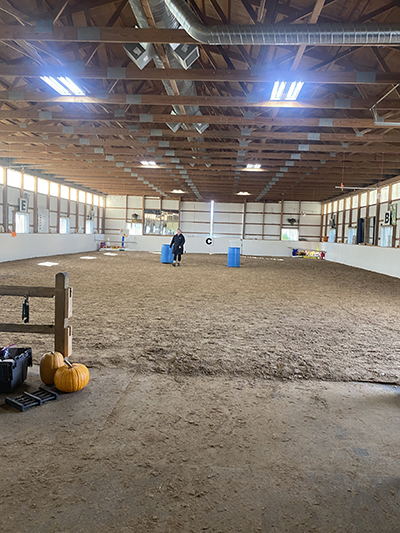
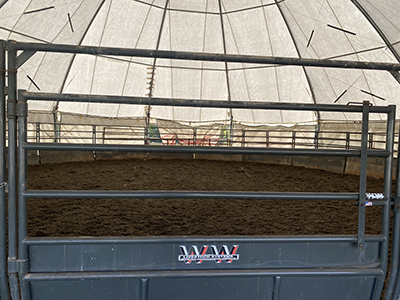
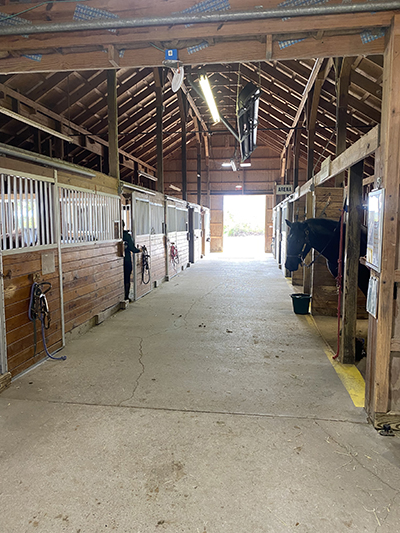
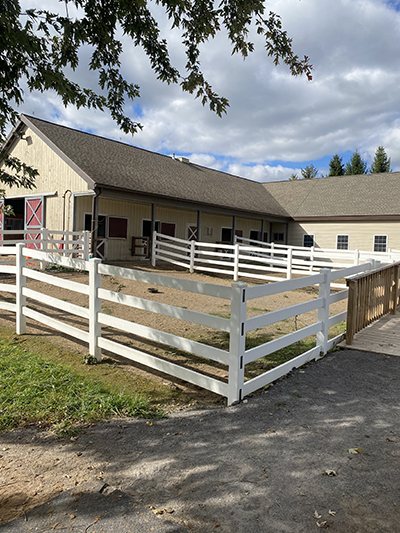
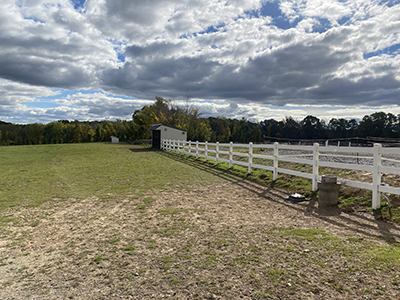
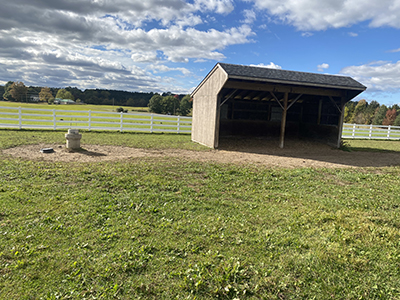
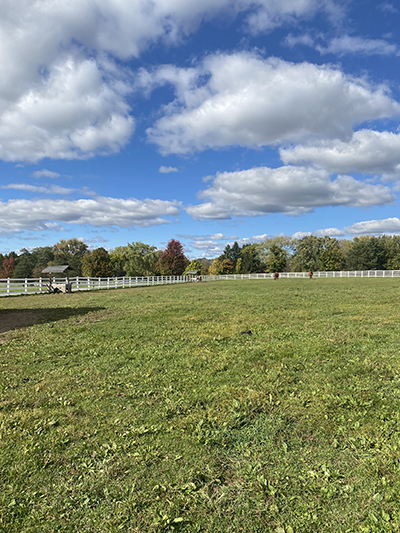
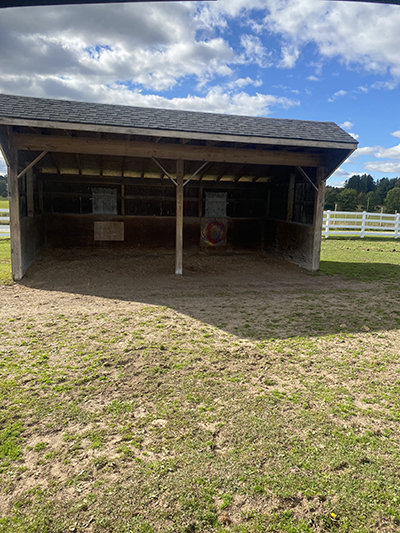
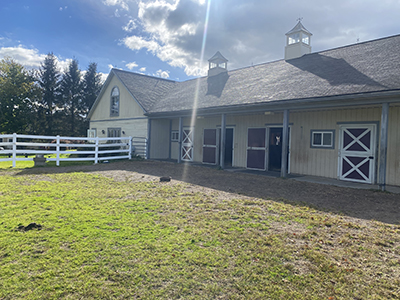
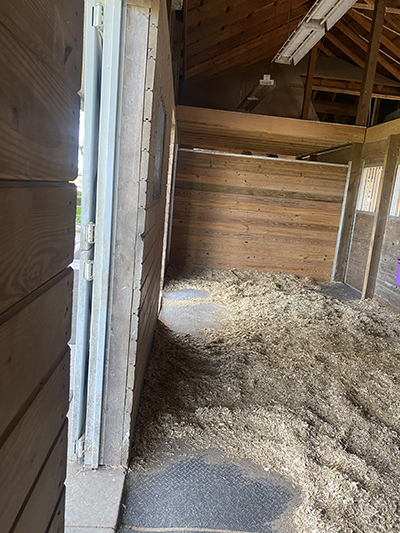
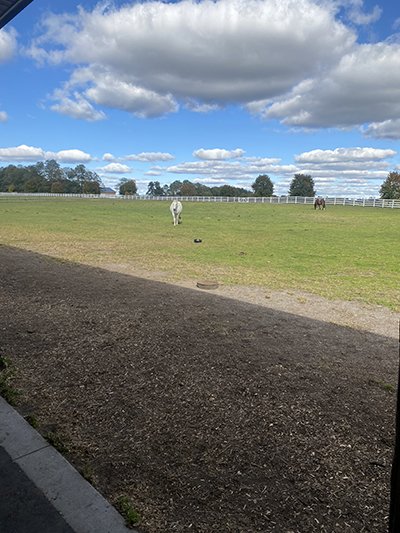
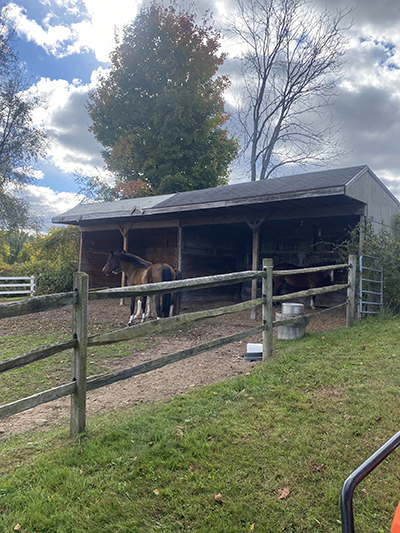
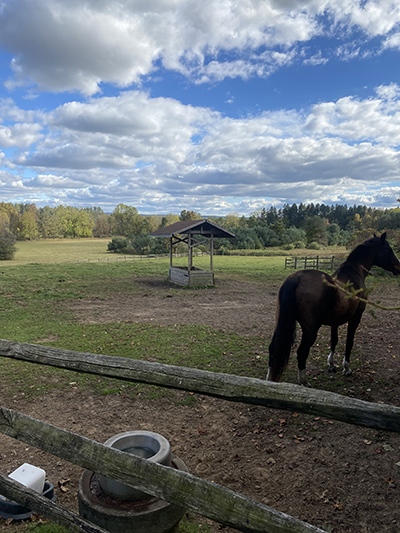
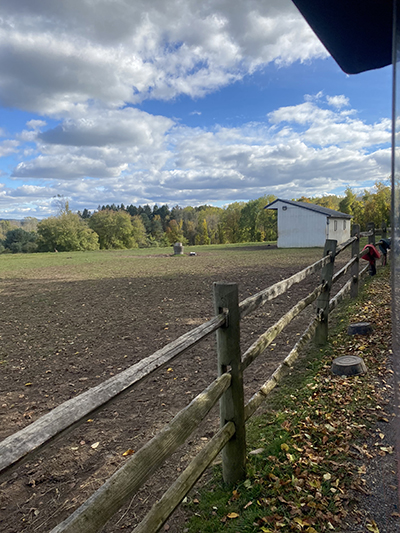
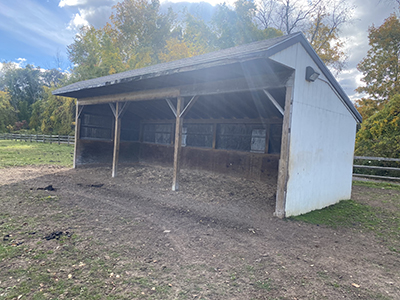
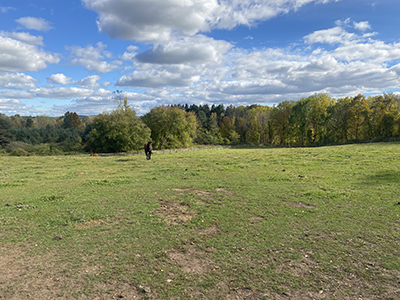
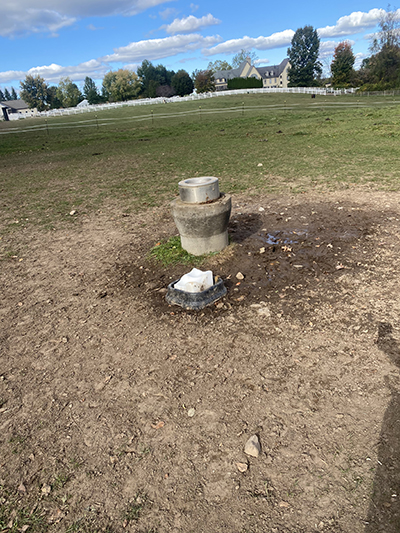
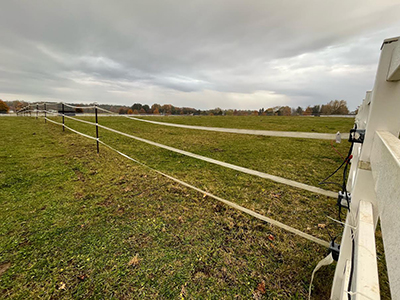
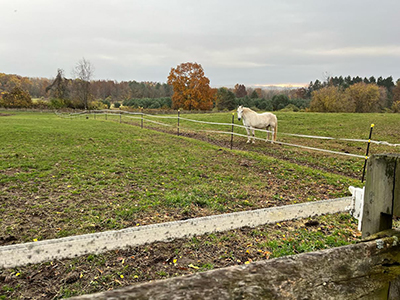
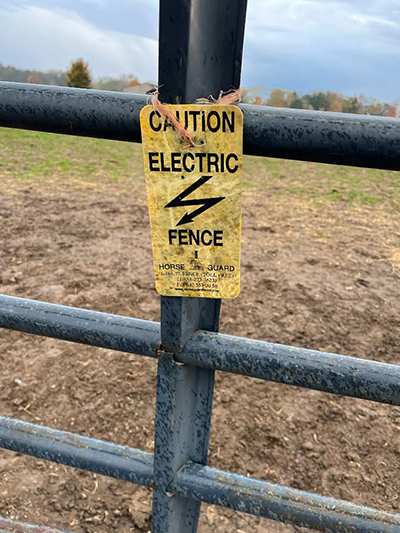
Are the organization's rules, restrictions and warnings (signage) conspicuously posted in easily accessible locations? Yes
Are the organization's emergency contacts, including veterinarian contact information, conspicuously posted in easily accessible locations? Yes
Are human and equine first aid kits easily accessible? Yes
Regarding all shelters where horses are housed including run-in sheds:
Do horses have assigned stalls in the barn/structure(s) or exclusively assigned shelter locations where they are separated from other horses with a barrier? No
How many hours per day, on average, are horses stalled or restricted to these sheltered exclusive shelter locations? 0-3;
How often are the stalls/shelters cleaned, i.e., kept in good repair and free of standing water, accumulated waste, sharp objects and debris? 6-7 Days a Week
Do all stalls/shelters allow horses to lie down, stand up and turn around and provide protection from inclement weather (wind, sleet, rain, snow and extreme temperatures)? Yes
Are stalls/shelters kept in good repair, with adequate ceiling height, and free of standing water, accumulated waste, sharp objects and debris? Yes
Are floors constructed and maintained for both good drainage and traction? Yes
Is there a ventilation and circulation system in place to allow free flow of air to control temperature, and humidity, and to prevent air stagnation? Yes
Is wiring inaccessible to horses and maintained for safety in all areas of facility? Yes
Are fire prevention/protection measures (fire alarms, extinguishers and sprinkler systems) maintained and in good working order? Yes
Is there adequate lighting to ensure safety in all areas of facility? Yes
How many hours per day, on average, are horses turned out:
Equines are out 24/7
Equines are out 24/7 except when they are being trained
Equines are out 24/7 except when they are used for the conduct of the organization's programs
The following describes the pastures at this facility:
This facility has a written plan in place for pasture management, which includes guidelines for seeding, fertilizing, irrigation, mowing, dragging, harrowing, manure removal, removal of debris, the control of poisonous plants, and a schedule for cleaning
A dedicated staff person(s) is responsible for pasture management
All pastures are fenced to prevent escape or injury
Electric fencing is used; electric wires or tape fence are visibly marked
Fencing checks, such as broken or missing planks, loose fence posts, exposed or loose nails, detached wires, etc., are done regularly
Pastures are rotated
Pastures have man-made protection for equines (i.e., shelters)
This facility does not have pastures where equines can graze on pasture grass
Barbed wire is used for fencing
Pastures have natural protection for equines (i.e., trees)
The following describes the turnout areas other than pastures at this facility:
This facility has a written plan in place for the maintenance of turnout areas, which includes a schedule for cleaning, manure removal, and dragging
A dedicated staff person(s) is responsible for the maintenance of turnout areas
All turnout areas are fenced to prevent escape or injury
Turnout areas have man-made protection for equines (i.e., shelters)
Fencing checks, such as broken or missing planks, loose fence posts, exposed or loose nails, detached wires, etc., are done regularly
This facility does not have turnout areas
Barbed wire is used for fencing
Electric fencing is used; electric wires or tape fence are visibly marked
The following policies and procedures are in place at the facility to restrict public access and to keep horses safe:
There is a mechanism in place to monitor equines overnight
No Trespassing signs are posted
Hold Harmless signs are posted
Authorized Personnel Only signs are posted
Entrance gates are locked at night
Visitors are only permitted at specific times
Visitors are only permitted in specific areas
The property is fitted with motion lights
The property is fitted with a security system that is monitored internally by staff (or the property owner)
The property owner, staff member or caretaker lives on the premises and ensures that public access is restricted and is responsible for the security of the facility and equines
A security guard is present at night
By Appointment Only signs are posted.
The property is fitted with a security system monitored by police or a professional service
The perimeter of the property is fully fenced
Equine Care/Emergency Preparedness: EquiCenter (*Main) 2026 and 2025 This section is required.
Horse Health Care/Barn Management Records: What system is used to collect and store health/horse care records?
Notebook or equivalent (technology not utilized)
Onsite computer with cloud-based backup storage system
Our organization utilizes a software application to maintain records
The following items are consistent with our feed management plan and practices:
Equines are provided with individualized feeding plans, including supplements, according to the equine's age, breed/type, condition, size, work level and any health issues, consisting of nutritious food provided in sufficient quantity and access to adequate natural forage, or be fed daily, or as recommended by the organization's veterinarian
Feed plans are determined in consultation with a veterinarian
Supplement plans are determined in consultation with a veterinarian
Equines are fed grain in groups
Staff and/or volunteers are trained in proper feed measurements and protocols and observed periodically to ensure they are feeding correctly
The feed chart is centrally located and updated as needed
The area(s) where hay, feed, grain, and supplements are stored are kept clean, free of debris and chemicals, and protected from weather and other animals in rodent-proof and mold-proof containers and grain bins
Feed, supplements and hay types are clearly labeled
Water sources, i.e., buckets, troughs, automatic waterers, etc. are kept clean, free of contaminants, debris and chemicals, protected from weather and other animals, and be positioned or affixed to minimize spillage.
Medications are kept in a secure area
Equines are fed grain in individual stalls
Is clean, potable water available at all times for all equines? Yes
Hoof Care: How often is hoof care provided for each equine? Every 4-8 weeks and when an issue arises
Dental Care: How often is dental care provided for each equine? Annually and when an issue arises
Horse checks: How often are equines visually and physically checked by personnel at the facility? Every day or 6 days a week
Our organization has the following parasite and fly/insect control protocols in place, including remedies used to control flies and insects:
Our organization follows the parasite control guidelines of our veterinarian, including fecal testing and de-worming
Fly/Insect Control Remedies:
Fly Traps and Tapes
Fly Spray Repellent
Fly Masks
Fly Sheets
Fans
The following represent the biosecurity practices in place at facility:
Our organization follows the biosecurity guidelines of our veterinarian
Sick, affected and/or quarantined equines do not have contact with other equines or other animals
Staff are trained in best practices related to biosecurity
A specific individual is trained and assigned to care for sick, affected and/or quarantined equines
Sick, affected and/or quarantined equines are cared for last if the caretaker must also care for healthy equines
Restricted access signs are posted at primary points of access to sick, affected and/or quarantined equines
Hand sanitizers are available at all primary points of access to sick, affected and/or quarantined equines
Footbaths are available at all primary points of access to sick, affected and/or quarantined equines
Manure and bedding from sick, affected and/or quarantined equines is removed from the facility - not put in open air piles, and not spread on pastures
Quarantine areas, such as stalls, aisle ways, paddocks, and common areas, are cleaned (and needed, disinfected) after conclusion of the quarantine.
Trailers/vans used by sick, affected and/or quarantined equines are cleaned and disinfected after each use and cleaning takes place away from where equines are sheltered
Equipment used by sick, affected and/or quarantined equines is not shared
Equipment used by sick, affected and/or quarantined equines is cleaned of organic debris and disinfected after each use
Latex gloves, or equivalent gloves, are worn when working with sick, affected and/or quarantined equines
The organization has a written biosecurity plan
Volunteers are trained in best practices related to biosecurity
Equines are not quarantined on arrival.
Additional information on biosecurity:
Our horses do not travel. New horses are quarantined upon arrival.
The following represent the manure removal practices in place at facility:
Manure is piled in an area where equines are not located
Manure piles are composted or spread on pastures
Our organization adheres to the manure management guidelines set by the state, local authorities, and/or our organization's veterinarian
Manure is stored in dumpster(s)
Manure piles are covered
Manure is hauled, sold or given away
The following steps are taken to help staff and volunteers readily identify each horse on the property:
Equines wear halters with nametags
A notebook or binder with photos and information on each equine is easily accessible
A map/diagram is posted showing the location of each equine with equine names and photos
Equine photos and profiles are available on the website
Staff and volunteers are provided with an information packet with equine profiles, including photos and detailed descriptions
Staff/volunteers are provided training on conformation, markings, colors, and breeds
Team leaders work with new staff/volunteers until they are able to identify the equines
Equines are assigned the same exclusive stall/shelter location each day
Name plates are located on the stall/shelter location
Photos are located on the stall/shelter location
Our organization has the following policies and procedures in place pertaining to tack, apparel and equipment:
Saddles are shared
Saddle pads are shared
Blankets, sheets and turn out apparel are fitted and utilized for each equine appropriate to the equine's needs and the weather conditions
Blankets, sheets and turn out apparel are cleaned regularly as needed
Riding Tack is always cleaned after each use
Riding Tack is inspected for overall working condition before each use by trained personnel
Riding Tack is assessed for fit before each use by trained personnel
Riding Tack is assessed for fit by trained personnel when an equine's body condition changes
Riding Tack is assessed for fit by trained personnel when an equine's disposition changes
This facility enlists the services of a professional saddle fitter at least once a year
Assigned riding tack is clearly labeled
Riding Tack is stored in a climate-controlled location
Helmets are shared
Helmets are cleaned/disinfected after each use
Helmets are replaced after a fall
Helmets are replaced at least every five years.
All equines have specifically assigned apparel, equipment and tack (saddles/bridles if ridden) that is not shared
Bridles are shared
Bits are shared
Blankets are shared
Sheets are shared
Turnout apparel is shared
Halters are shared
Riding Tack is always cleaned at least weekly
Riding Tack is cleaned only when needed
No equines are ridden; saddles, bridles, etc. not applicable.
Emergency Preparedness: EquiCenter: *Main This section is required.
The following plans, policies, and procedures are in place at the facility to handle emergencies and address weather related issues, fire safety procedures, and/or any additional hazardous scenarios the facility could potentially experience:
Emergency procedures are posted prominently
The facility maintains at least two weeks of hay, feed, shavings and medications
The facility collects and maintains medical information from staff, volunteers, and clients
The facility maintains appropriate liability and/or workers' compensation insurance
The organization has a written emergency preparedness/safety plan (EPP)
The facility owns or has access to a generator
Local fire department and/or the state's emergency planning department procedures
Medical emergencies for clients, staff, and volunteers
Medical emergencies for equines
Evacuation plans
Power outages
Fire
Natural Disasters - thunderstorm, hurricanes, earthquakes, tornados, etc
Terrorist attacks
Protocols to notify emergency personnel
Building/facility exit plans
The facility follows the specific procedures to help PREVENT emergency situations:
Smoking is strictly prohibited
NO SMOKING signs are posted prominently
Hay is stored away from permanent or temporary structures where equines are stalled
Permanent or temporary structures where equines are stalled are kept free of dust, cobwebs, trash, cleaning rags, and other flammable items
Aisles and doorways are kept clear
Heaters with automatic shutoff settings are used
How often are the following checked or performed?
Fire Extinguishers are checked: Monthly
Smoke detectors are checked: Monthly
Fence lines are checked: Weekly
Turnout Areas are checked: Daily
Sprinkler systems are checked: Not at all/NA
Fire drills are conducted: Quarterly
Review of safety protocols with staff are conducted: Quarterly
Review of safety protocols with volunteers are conducted: Quarterly
The Emergency Preparedness Plan is reviewed and updated: Quarterly
Equine Transportation: 4= Onsite: 0 (0 + 0) + Offsite: 4
2-horse van/trailer with truck:
2 Access offsite;
3-horse van/trailer with truck:
1 Access offsite;
6-horse van/trailer with truck:
1 Access offsite;